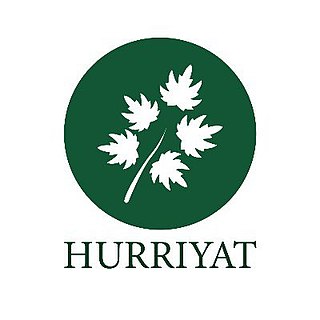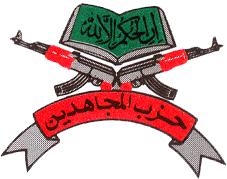
Jamaat-e-Islami, or Jamaat as it is commonly known, is an Islamist political party based in Pakistan and founded by Abul Ala Maududi. It is the Pakistani successor to Jamaat-e-Islami, which was founded in colonial India in 1941. Its objective is the transformation of Pakistan into an Islamic state, governed by Sharia law, through a gradual legal, and political process. JI strongly opposes capitalism, communism, liberalism, and secularism as well as economic practices such as offering bank interest. JI is a "vanguard party", whose members are intended to be leaders spreading party beliefs and influence. Supporters not thought qualified to be members may become "affiliates", and beneath them are "sympathizers". The party leader is called an ameer. Although it does not have a large popular following, the party is quite influential and considered one of the major Islamic movements in Pakistan, along with Deobandi and Barelvi.

Syed Ali Shah Geelani was an Islamist, Pro-Pakistan Kashmiri-separatist leader in the Indian-administered Jammu and Kashmir, regarded as the father of the Kashmiri jihad.

All Parties Hurriyat Conference (APHC) is an alliance of 26 political, social and religious organizations formed on 9 March 1993, as a united political front to raise the cause of Kashmiri separatism in the Kashmir conflict. Mehmood Ahmed Saghar was the first convener of the APHC-PAK chapter when the alliance was established in 1993. The alliance has historically been viewed positively by Pakistan as it contests the claim of the Indian government over the State of Jammu and Kashmir. The organisation is split into two main factions the Mirwaiz and Geelani, The Mirwaiz Umar Farooq is the founder and chairman of Mirwaiz faction and the Masarat Alam Bhat is the interim chairman of Geelani faction faction he succeeded Syed Ali Shah Geelani after his dead who was the founder and chairman of Geelani faction.

Hizbul Mujahideen, also spelled Hizb-ul-Mujahideen, is an Islamist militant organization operating in the Kashmir region. Its goal is to separate Kashmir from India and merge it with Pakistan. It is one of the most important players that evolved the narrative of the Kashmir conflict from nationalism to radical jihad.
The United Jihad Council, also known as the Muttahida Jihad Council (MJC), is a militant organization formed by a council of militant leaders for unified command and control over separatist resistance militant groups operating in Indian administered Jammu and Kashmir. It was formed in the summer of 1994 and is currently headed by Syed Salahuddin, the leader of Hizb-ul-Mujahideen. The organisation was created to unify and focus efforts of various armed militant groups fighting against Indian occupation in Kashmir. This made distribution of resources, ammunitions and communications more streamlined. It also made it easier to coordinate and collect information, plan operations and strike at targets of military importance inside Indian administered. Pakistani officials have admitted aiding the militant separatist group of Hizb-ul-Mujahideen by providing them with military backed training.Kashmir.
Mohammad Yusuf Shah, commonly known as Syed Salahuddin, is the head of Hizbul Mujahideen, an organization operating in Kashmir. He also heads the United Jihad Council, a Pakistan-based conglomeration of jihadist militant groups sponsored by the ISI, with the goal of merging Jammu and Kashmir with Pakistan.
Muhammad Ahsan Dar is a Kashmiri Islamist militant separatist leader from Jammu and Kashmir. He was the founder of an Islamist militant group called Ansarul Islam in mid-1980s, which later became the core of Hizbul Mujahideen. Formed in September 1989, Hizbul Mujahideen was an umbrella group of a dozen Islamist groups in the Kashmir Valley and was sponsored by Pakistan's Inter-Services Intelligence and Jamaat-e-Islami. Ahsan Dar served as the head of the united group for a few years, but was marginalised the Jamaat-e-Islami patron Syed Salahuddin. He later founded a new group called Muslim Mujahideen in 1992, which operated for a few years. It was eventually neutralised by Hizbul Mujahideen and Indian security forces, and Ahsan Dar retired from militancy.
Ashfaq Majeed Wani was the first Commander in Chief of the Jammu Kashmir Liberation Front, a militant Kashmiri-separatist group in Jammu and Kashmir, India. He was killed by Indian Paramilitary Forces in 1990 at the age of 24. He was allegedly involved in the kidnapping of Rubiya Sayed, daughter of Mufti Mohammed Sayeed, the then Home Minister of India.
The Jammu and Kashmir Awami League is a political party in the Indian-administered union territory of Jammu and Kashmir. The party was founded by members of different counter-insurgent groups in November 1995. It supports article 370 of the Indian constitution, granting special status to Jammu and Kashmir. The party argues that the people of Jammu and Kashmir have the right to self-determination within the Indian constitutional framework, but not accession to Pakistan nor independence.

Burhan Wani was a commander of Hizbul Mujahideen, an Islamist militant organization and insurgent group of the Kashmir conflict. He had become a popular figure amongst the local Kashmiri populace, having done so primarily through a strong social media presence, and was responsible for moulding the insurgency in Jammu and Kashmir into a youth-oriented movement. Wani was a militant leader and had reportedly recruited numerous foot-soldiers through his personal efforts.
Farooq Ahmed Dar known by his nom de guerre Bitta Karate, is a Kashmiri-separatist militant , who currently serves as the chairman of the Jammu Kashmir Liberation Front (R) in the Kashmir Valley of Jammu and Kashmir, India.
Zakir Rashid Bhat was a Kashmiri separatist who became the commander of Hizbul Mujahideen after the killing of Burhan Wani and Sabzar Bhat, who were the former commanders of the same outfit. He later became the chief of Ansar Ghazwat-ul-Hind.
Sabzar Ahmed Bhat was a kashmiri militant, who is the area commander of the militant organisation Hizbul Mujahideen. He was killed in an encounter by the police on 26 May 2017 at Saimoh Tral

Indian Army operations in Jammu and Kashmir include security operations such as Operation Rakshak, which began in 1990, Operation Sarp Vinash in 2003 and Operation Randori Behak in 2020. Other operations include humanitarian missions such as Operation Megh Rahat and operations with a social aim such as Operation Goodwill and Operation Calm Down. The Indian Army works in tandem with the other arms of the Indian Armed Forces and security forces in Jammu and Kashmir such as during Mission Sahayata or joint operations.

Ansar Ghazwat-ul-Hind is an Al-Qaeda-affiliated Islamist militant group active in Kashmir. The group's stated objective is to create Kashmir as an independent Islamic state under Sharia law and jihad against India.
Mohammad Ashraf Khan, chiefly known as Ashraf Sehrai or just as Sehrai, was a Kashmiri separatist leader and chairman of Tehreek-e-Hurriyat, a Kashmiri separatist political party. He was elected chairman through a first-ever election conducted in the history of Hurriyat when Syed Ali Shah Geelani relinquished office due to his deteriorating health.
Riyaz Ahmad Naikoo was one of the top ten most wanted militant commander of Jammu and Kashmir. He was a top commander of Hizbul Mujahideen, an Islamist Pro-Pakistan militant organization active in Jammu and Kashmir.
Abdul Hamid Bhatt was a commander in the Islamist militant organisation Hizbul Mujaheddin. He was killed in an encounter on 13 March 2000 by Indian security forces. Hamid Gada, at the time of his death, was the most wanted North Kashmiri militant. He had been called "Jammu and Kashmir's most important terrorist leader" by Indian journalist Praveen Swami, responsible for the massacres of numerous Kashmiri Hindus, including the 1998 Wandhama massacre. Press Trust of India said that in total, over a period of ten years of militancy, he was responsible for killing over a hundred civilians.

The Resistance Front or TRF is a separatist militant organization involved in the ongoing insurgency in Jammu and Kashmir. The organization has positioned itself as a secular organization fighting against the Indian government for Kashmiri freedom, in contrast to past Kashmiri insurgents which have been Islamist. The Indian government has accused the TRF of being an offshoot of Pakistan-based Lashkar-e-Taiba, a claim that TRF has denied. TRF operates primarily in the Kashmir region, with a main base in Srinagar.











